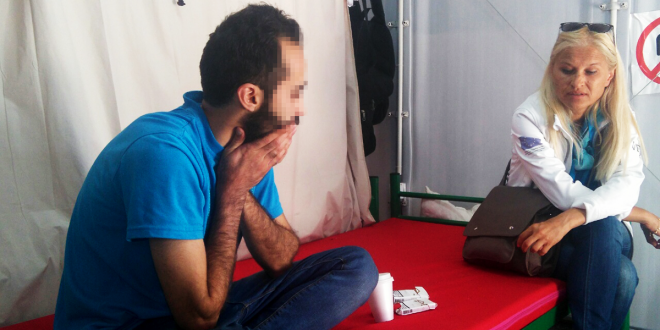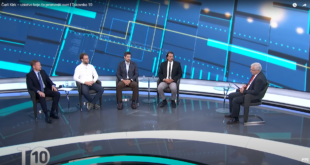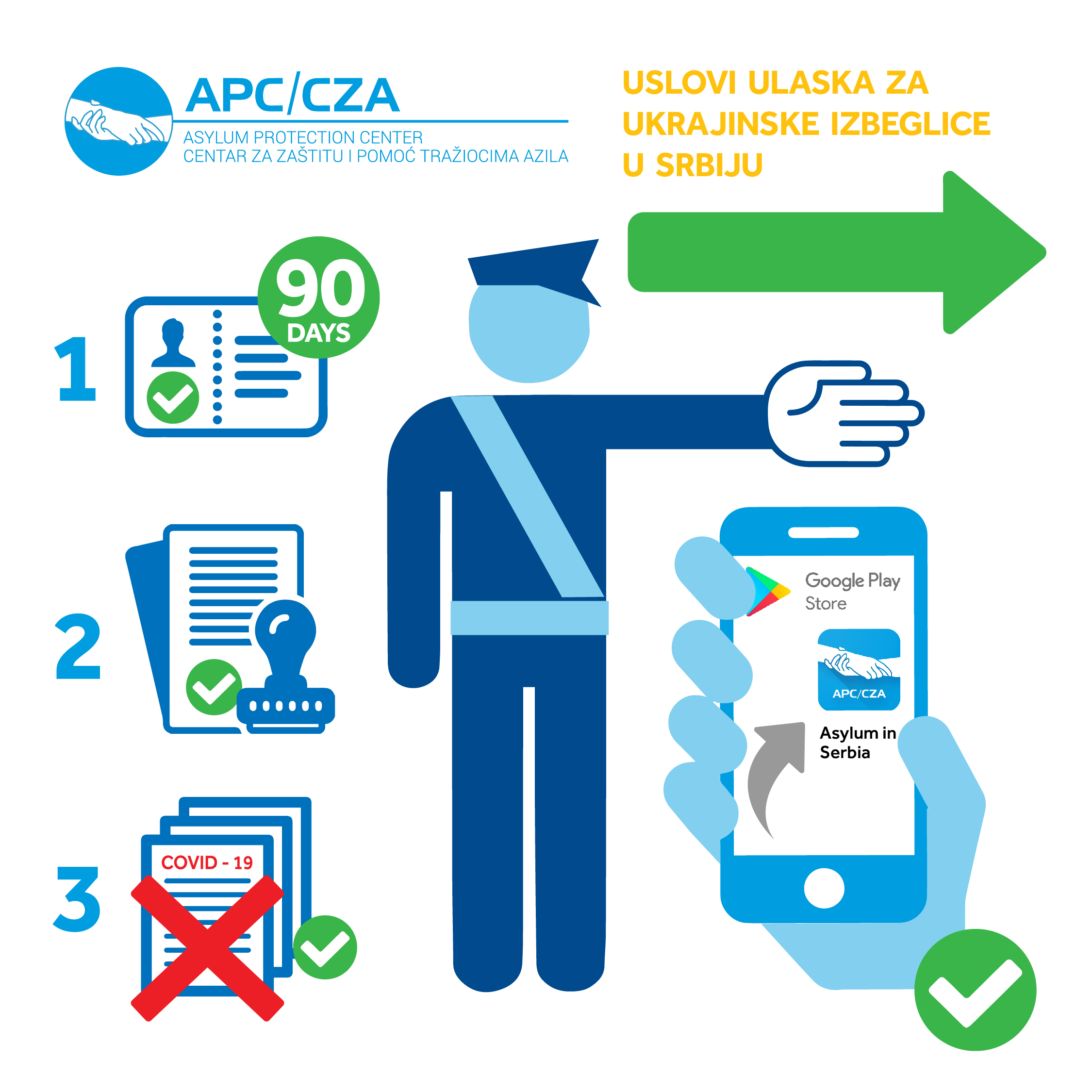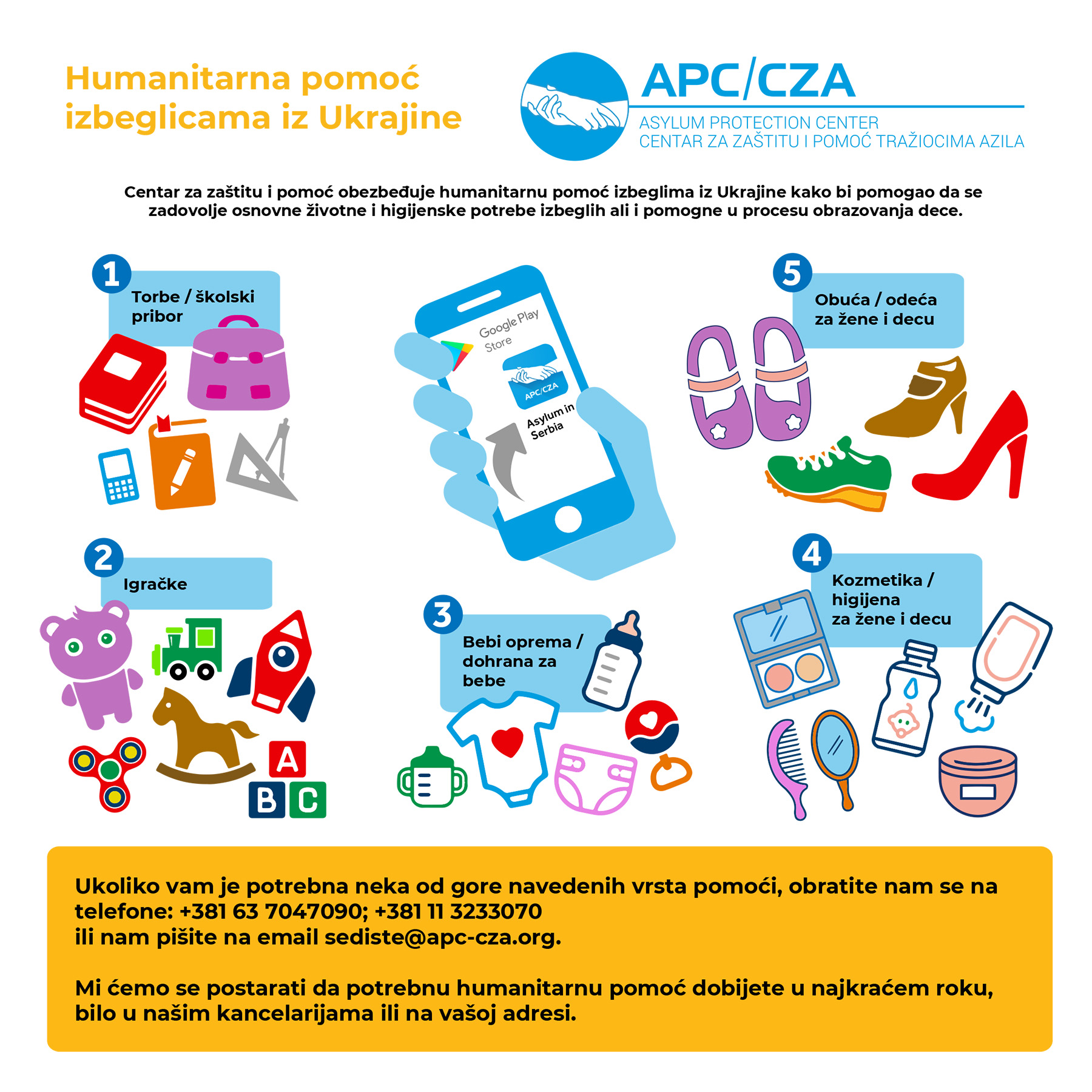Krnja?a, Preševo, Sjenica, 22. maj – Kada se naš prevodilac Saker na arapskom obratio pedesetogodišnjoj ženi koja je sama sedela u uglu trpezarije Centra za azil u Krnja?i ona je odmah po?ela da pla?e. Krajem marame briše suze i puna nade gleda u prevodioca i nas koji smo došli, kao i svaki drugi dan da vidimo možemo li nekako pomo?i ovim ljudima. ?uli smo da je tek stigla ovde. Iz Sirije je. Sa sinom i trudnom snahom pokušala je da pre?e granicu sa Hrvatskom. Sin i snaha su prešli, ona nije uspela.
„Nisam mogla brzo da tr?im“, samooptužuju?i se, ponavlja. „ Ne daju mi sada da idem za njima. A ja sam im majka, kako me ne puštaju!?“, jeca nesre?na žena kojoj više nije važno gde je. Važno joj je samo da je sa svojima. I ne vidi zašto je to nemogu?e.
Ne može da razume Hadija, kako nam re?e da se zove, zakone i propise koji spre?avaju majku koja je krenula sa svojom porodicom da bude uz njih. Ne može da razume da je ostala u tu?oj zemlji i da ne zna gde ?e i kako ?e dalje, da su i njen Samir i trudna Fatima u toj susednoj Hrvatskoj koja nije njihov krajnji cilj, da niko ne ?uje njene molbe i ube?ivanja kako je potrebna svojoj deci… Slušamo je i umirujemo, upoznajemo sa zakonom i kako u Srbiji može da reguliše svoj status, ali ona nas sada i ne ?uje. Samo o?ajno ponavlja -„ Što nisam brže tr?ala…što nisam…“. Naš psiholog je umiruje, uzima telefon od nje i daje prevodiocu da nazove njenog sina. Razgovaraju, sada umirujemo i sina. Pri?a nam da je u prihvatnom centru u Hrvatskoj, moli nas da pomognemo… Ovaj razgovor nesre?nu ženu malo ohrabruje, ali treba?e joj još vremena da se smiri i da zajedni?ki sa svojima odlu?i šta ?e dalje.
Svakodnevno u našim obilascima izbegli?kih kampova i centara za azil od Subotice, Šida, Krnja?e, Banje Kovilja?e do Preševa, Sjenice i Tutina susre?ete se ovim nesre?nim ljudima, njihovim mukama, dilemama… Pri?e su razli?ite, a opet u jednom iste – posle zatvaranja balkanske rute ostali su zaglavljeni u Srbiji. Ne žele ovde da ostanu. Njihov cilj su Nema?ka, Švedska, Holandija… Mnogim od njih su tamo i ?lanovi porodica. Kada su krenuli na put on je za njih bio otvoren. Sada više nisu dobrodošli. Ne znaju šta da rade… Neki od njih ?ekaju priliku da preko krijum?ara nastave dalje, neki nemaju novca i razmišljaju o podnošenju zahteva za azil u Srbiji.
Pomažemo. Informišemo. Družimo se. Osnažujemo. Izvla?imo najpozitivnije iz njih, podsti?emo da se suo?e sa realnoš?u i da u okviru datih okolnosti na?u najbolje mogu?e rešenje za sebe.
Zakarija ima 25 godina diplomirao je bioinženjering u Alepu. Iz Damaska je, iz predgra?a Kabuna, gde su po?eli prvi protesti opozicije u sirijskoj prestonici protiv Asadovog režima. To mu je odredilo dalju sudbinu.
Susre?emo ga u Prihvatnom centru u Preševu. Sam je u sobi. odabrao je da bude sam. Da sabere misli da vidi šta ?e dalje. Krenuo je na put sredinom januara i nije uspeo da stigne dalje od Srbije. Zatvorena je balkanska ruta, a on ostao. Zaglavljen. Ni tamo, ni ovamo. A nosi veliki teret na le?ima. Porodica mu zamera što je otišao. A majka koja je lekar nije htela da napusti Damask. Rekla je – „Otac ti je u zatvoru. Ko ?e ga obilaziti? Ne?emo ga valjda ostaviti? Nema ni dovoljno lekara koji le?e pobunjenike. Potrebna sam im!“
Njegov brat koji tako?e nije hteo da ostavi roditelje, sada je uhapšen. Zatvorili su ga zato što je Zakarija pobegao.
„A morao sam da bežim“, kaže, „Dva puta sam hapšen“.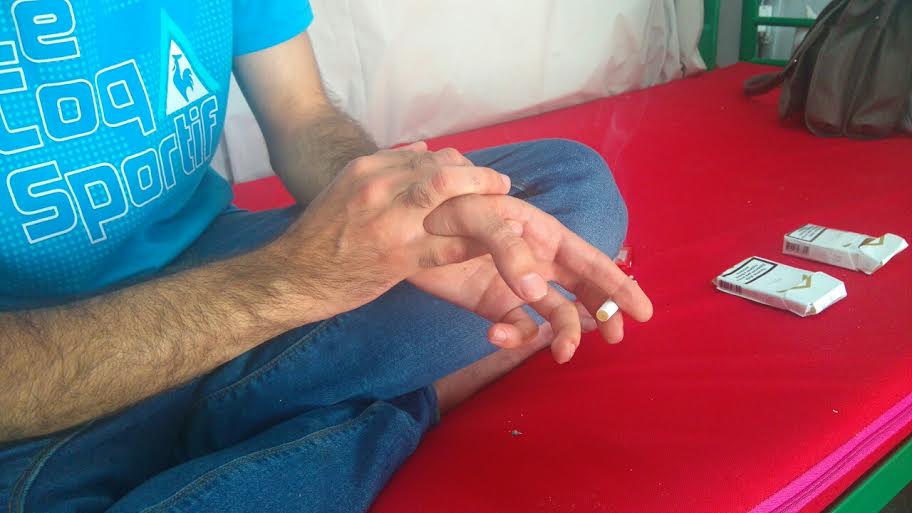
Kaže da nije u?estvovao u sukobu sa vladinim snagama, ali su ga obaveštajne službe, nakon što mu je prvo otac uhapšen, locirale kao potencijalnog opozicionara i prvi put uhapsile 2012. u džamiji sa nekolicinom prijatelja, a onda drugi put prošle godine u igraonici gde je tako?e bio sa prijateljima. Prvi put je proveo u zatvoru 11 dana, drugi 42. Mu?en je, vešali su ga za ruke i držali po 24 sata tako obešenog, 30 santimetara od zemlje, držali u prostoriji metar sa dva, sa još 70 ljudi, terali da prizna da je sara?ivao sa pobunjenicama… Izdržao je i pustili su ga. Kada se vra?ao ku?i kaže nije pri?ao svoje muke.
Niko nije ni pitao. Jer lakše je kada se ?uti. Samo je njegova baka prokomentarisala – Zakarija se malo izgubio, pa se opet vratio…
Pri?a nam kako se izvukao iz Damaska, kako je uspeo da u?e u avion za Bejrut, a odatle u avion za Istanbul. – Kada sam ušao u avion za Istanbul osetio sam ogromno olakšanje, a kada sam se pogledao u ogledalo video sam da sam ostario za šest godina. Nije ni slutio da ?e se njegove muke nastaviti. Iz Istanbula je kaže kamionom stigao do Izmira, a onda preko mora do Lezbosa. Trgovac ljudima koji je izbeglice, me?u kojima je bio i Zakarija, ukrcao na svoj brod, iznenada se uplašio i prepustio ih same sebi. Pre nego to je pobegao dao je Zakariji uputstva kako da upravlja brodom. Uspeo je i to. Krenuo dalje i onda stigao do Srbije. Dalje se nije moglo.
Zakarija je sada opet „malo izgubljen“. Najviše ga mu?i to što mu je brat uhapšen zbog njega. U torbi ?uva lekove koje je poneo iz Damaska. Drži se nevidjivim nitima za svoj dom, a sada ne može ni nazad, niti može dalje. Sedi u Preševu i ?eka. Kaže, mi smo prvi kojima je ispri?ao svoju životnu pri?u.
Ona još nije završena. Zakarija se još nada. Pokazuje nam diplomu koju je preveo i na engleski. U njoj sve devetke i desetke. Spremio je svoj adut za novi život, veruju?i da ?e mu on otvoriti vrata, ako ve? ne?e patnja i pretnja smr?u od koje je pobegao. Zakarija voli da pri?a sa nama i sve ?eš?e nas pita – da li bi mogao da radi ako bi dobio azil u Srbiji. Jer za njega nema povratka.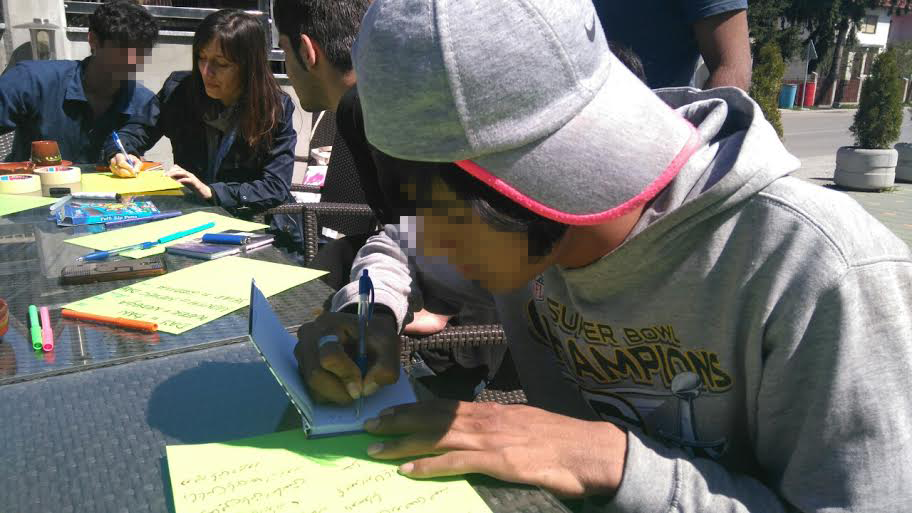
Ali devetnaestogodišnji Ahmed, Avganistanc iz Irana koga upoznajemo u Centru za azil u Sjenici, odlu?io je da se vrati. I njega mu?e brojne brige. Jedna od njih je i ljubavna. On je sa svojom devojkom i njenom majkom krenuo put boljeg života iz Širaza. Na hrvatsko-slovena?koj granici na proveri kod prevodioca njegova budu?a tašta je porekla da su oni porodica i Ahmed je vra?en. Izdaja ga je zabolela koliko i ?injenica da je ostao sa ove strane granice, da je ostao bez ljubavi i snova o zajedni?kom i sigurnom životu. Vra?en je u Srbiju i sada u Sjenici sabira ra?une. Kaže nam da je odlu?uo da se vrati u Avganistan. ?ini se da je njegova odluka, da se vrati u zemlju u kojoj nije ni živeo pomalo o?ajni?ka, ali je odlu?io. Kaže i za to je potrebno strpljenje. Nije se lako ni vratiti. ?eka odgovore iz ambasada Avganistana u Be?u, Sofiji…
—
REFUGEES STUCK IN SERBIA – LIFE ON HOLD
Krnjaca, Presevo, Sjenica, May 22 – When our interpreter Saker addressed in Arabic to a fifty years old woman who sat alone in a corner of the dining room of the Asylum centre in Krnjaca she immediately started to cry. She was wiping the tears wih her scarf, looking at us and the interpreter, who came like every other day to see if we can do something to help these people, with the eyes full of hope. We heard that she had just arrived here and that she is from Syria. She traveled with her son and daughter in law which is pregnant, and with them tried to cross Croatian border. Son and daughter in law managed to cross the border, but she failed.
„I could not run fast“, she repeated with self-blame. „And now, they are not leting me to go after them. I’m their mother, why they are not letting me go!? „, saying through sobbing the unhappy woman who no longer care where she is. The only thing that matters to her is that she is again with her family and she can not see why that is impossible.
Hadija, as she said her name is, can not understand the laws and regulations that prevent mother to be with her family. She can not understand that she is now in a foreign country without knowing where and how she’ll continue, and that her Samir and his pregnant wife Fatima are in the neighboring Croatia, which is not their final goal, that no one can hear her pleas and persuasion that her children need her … We listen to her and calm her down, explain her the law and how Serbia can regulate her status, but in a situation like this our words are not coming to her. She just desperately repeats – „Why didn’t I ran faster … why didn’t I …“. Our psychologist calms her, takes the phone from her and gives it to the interpreter to call her son. They talk, now we are also calming her son. He tells us that he is in the reception center in Croatia and begs us to help … This conversation calms a bit the unfortunate woman, but she will take much more time to calm down and to decide together with her family what to do next.
In our daily visits to refugee camps and asylum centers in Subotica, Sid, Krnjaca and Banja Koviljaca and further to Presevo, Sjenica and Tutin we encounter with these unfortunate people, their struggles and dilemmas … Their stories are different, but still the same in some points – after closure of the Balkan route they remained stuck in Serbia. They don’t want to stay here. Their goal is Germany, Sweden, Holland … Many of them have family members there. When they started with this dangerous journey, the road was open for them. Now they are no longer welcome. They don’t know what to do… Some of them are waiting for an opportunity to continue their journey with the smugglers, some do not have the money and they are considering to apply for asylum in Serbia.
We help. Inform. We socialize with them and empower them. We draw the most positive from them and encourage them to face the reality and that under the given circumstances find the best possible solution for them.
Zakaria is 25 years old graduate of bioengineering in Aleppo. Although he studied in Aleppo, he comes from Qaboun district in the Syrian capital Damascus, where the first opposition protest against the Assad regime started. That has determined his future fate.
S We meet him in the Reception Centre in Presevo. He was in the room. Alone, what was his choice. To gather his thoughts and to see what he’ll do next. He started with his journey in mid-January and failed to get further than Serbia. The Balkan route was closed, and he stayed. Stuck in Serbia. Neither there nor here. He carries a big load on his back. His family blame him because he left. A mother who is a doctor did not want to leave Damascus. She said – „Your father is in prison. Who will visit him? We’re not just gonna leave him? There are not enough doctors to treat the rebels. They need me!“
His brother, who also did not wanted to leave their parents, is now arrested. They imprisoned him because Zakaria fled.
„But I had to go away“, he says, „I was arrested twice.“
He says he was not involved in the conflict with government forces, but the intelligence services, after his father was arrested, marked him as a potential oppositionist and arrested him for the first time in 2012, when he was with some friends in the mosque, and then the second time last year when he was again with friends in one of the the playrooms. The first time he was in jail for 11 days, the second 42 days. He was tortured, they were hanging him by the arms and held him in that position for 24 hours, 30 centimeters from the ground, they also kept him in a solitary confinement or in a small room with another 70 people, forced to admit that he collaborated with the rebels… He withstood and they let him go. After he returned home he did not talk about his torment.
No one even asked. Because it is easier not to mention. Only his grandmother commented – Zakaria was a bit lost, and now he returned again.
He tells us how he got out of Damascus, how he managed to enter the plane to Beirut, and from there a plane to Istanbul. – When I got on the plane to Istanbul I felt a great relief, but when I looked in the mirror my reflection was not the same, I looked at least six years older. He had no idea that this was not the end of his torment. From Istanbul he went by truck to Izmir and then across the sea to Lesbos. The smuggler suddenly got scared and left behind refugees, among whom was Zakaria, alone in the boat. Before he ran away, he gave Zakaria the instructions on how to manage the boat. Zakaria has also managed to cope with that and to bring people to the shore. He continued further and came to Serbia where he is stuck.
Zakaria is now again „a little bit lost“. The most tormenting for him is that his brother had been arrested because of him. He keeps the medicines he had brought from Damascus in the bag. He is holding with the invisible threads for his home, although he cannot return, nor can go further. He is sitting in Presevo and waiting. He is saying that we are the first to whom he told his life story.
His story has not yet been completed. Zakaria still has hopes. He shows us the diploma which he translated into English. He has all nines and tens. He has prepared his trump card for a new life, believing that it will open the door for him, if not the suffering and death threats from which he escaped. Zakaria likes to talk to us and every time wants to know more and more – if he can work if he get asylum in Serbia. Because there is no return for him.
But nineteen years old Ahmed, an Afghan from Iran, whom we met at the Asylum Centre in Sjenica, decided to return. He is also tormented by many worries. One of them is love. In search of a better life he went from Shiraz along with his girlfriend and her mother. During the check with interpreter on the Croatian-Slovenian border, his future mother-in-law denied that they are family and Ahmed was returned. This betrayal hurt him as much as the fact that he remained on this side of the border, that he has lost the girl he loved and dreams on a common and secure life. He was returned to Serbia and now in Sjenica he’s summing the accounts. He told us that he decided to return to Afghanistan. It seems that his decision to return to the country in which he never lived is a bit desperate, but that is what he is decided. He says that for return is also required patience. It is not easy not to return. He is waiting for answers from the Embassies of Afghanistan in Vienna, Sofia…
We are people to whom no one rejoices. Nor those to who you return. I guess because it’s not our choice, but our defeat, tells this young man resignedly.
 AzilSrbija Centar za zaštitu i pomoć tražiocima azila
AzilSrbija Centar za zaštitu i pomoć tražiocima azila

